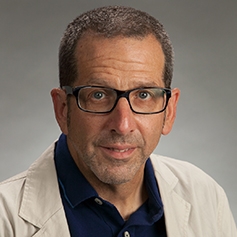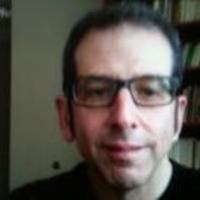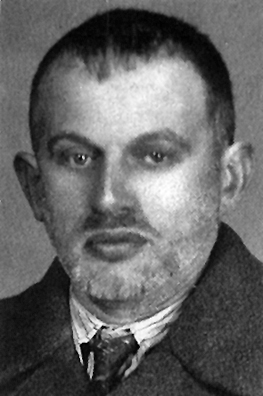Sunday, June 11th, 2017

Alan Astro PhD, Trinity University
By Carolyn Yeager
I happened upon this video and recognized my own text of Yiddish-to-French-to-English translation being used by this professor at a Catholic university in San Antonio TX. Though a native of Brooklyn, Alan Astro says he has been at Trinity University for over 25 years. His field is modern languages and literatures; one of the subjects he teaches is Yiddish culture.
His lecture, titled “Christianity and the Holocaust in Elie Wiesel’s Night” was filmed by St. Francis College and at the 6min59sec mark, he shows text from my very important 2012 article “Night #1 and Night #2—What Changes were Made and Why, Part One.” So you never know who is reading this site – a lot of people and all people who have a professional interest in Elie Wiesel.
At 6:59, Astro shows text translated by Kladderadatsch for this web site, which he calls “Where’s the tatoo?” (sic). He says that even though Yiddish was not known very well even in the Jewish world … “Holocaust deniers somehow get their hands on the Yiddish and manage to get it translated. Here is one holocaust denier or minimizer on the web who makes a whole big deal about the fact that in the Yiddish and French and English original translations Wiesel “is not quite 15” when he is arrested and sent to Auschwitz, whereas he is 15 in the newest edition and this is considered to be something that somehow questions the veracity of the whole historical knowledge of the Holocaust. But that’s another issue all together. But it does show you that things can very often have strange consequences.” (He goes quickly to something else at 8:10. So Astro has my text on the screen for one minute, 11 seconds, enough time to read it all.
This is the segment he used:
3. Not yet fifteen … or fifteen?
UdV Page 63 : Yingl, vi alt bistu? fregt mir a heftling. Zeyn pnym iz geven in der fintster, ober zeyn kol iz geven a mids, a varems. Nokh nisht keyn 15 yor, hob ikh geentfert.
“Kid, how old are you?” a prisoner asked me. His face was in darkness, but his voice was tired and warm. “Not yet 15 years,” I answered.
LN Page 54: Hé, le gosse, quel âge as-tu? C’était un détenu qui m’interrogeait. Je ne voyais pas son visage, mais sa voix était lasse et chaude. “Pas encore quinze ans.” / Not yet 15 years.
SR Page 39: “Here, kid, how old are you?” It was one of the prisoners who asked me this. I could not see his face, but his voice was tense and weary. “I’m not quite fifteen yet.”
MW Page 30: “Hey, kid, how old are you?” The man interrogating me was an inmate. I could not see his face, but his voice was weary and warm. “Fifteen”
This very important passage was discussed above. I think the reader would agree that “not yet 15″ can mean even farther from the age of 15 than “not quite fifteen.” What is clear is that Marion Wiesel has changed the author’s original words to fit them to her husband’s age in Spring 1944.
Astro dismisses this important observation with the misrepresentation (in boldface above) that the example is intended to negate the entire holocaust story. No, it isn’t; obviously it questions the veracity of Elie Wiesel’s truthfulness in “Night” since this scene took place in April or May, and the real Wiesel’s 16th birthday was coming up on September 28, 1944. Thus Wiesel was not 14 in Spring ’44, but had already been 15 for at least 7 months. Astro is not interested in telling that to his audience or pursuing it himself. He is a professor of languages and literature, but not an expert on Elie Wiesel or the Holocaust. Far, far from it.

Another photo of Professor Alan Astro.
At 19:33, hear him pronounce Wiesel’s name as weasel (as I say it) and then quickly correct himself to the affectation Wie-zell that he used throughout the talk. This indicates that ‘weasel’ is his default way of pronouncing the name, or the way he first learned it.
At right is another photo of Professor Astro I found online that gives what might be a truer look at the man.
8 Comments
Category Featured | Tags: Tags: Elie Wiesel, Naomi Siedman, Night, Un di Velt Hot Gesvign,
Social Networks: Facebook, Twitter, Google Bookmarks, del.icio.us, StumbleUpon, Digg, Reddit, Posterous.
Friday, June 9th, 2017

Shlomo Wiesel, Elie’s father, in 1942, a young looking man.
By Carolyn Yeager
Elie Wiesel wrote two ‘official’ accounts of his 1944-45 concentration camp experience: his novel Night (1958) and his official autobiography (Part One), All Rivers Run to the Sea (1995). Thirty-seven years separate these two publications.
Three articles written by me in 2011 (and here) and 2012 contain information that demonstrate conclusively that Night is not a true account of the experience Wiesel may have had with his family at Auschwitz-Birkenau in 1944. Night is written for “effect” and to be a gripping father-son drama that rises to the standards of a literary work of art. Night cannot, therefore, be called Wiesel’s testimony – a claim he made on several occasions.
Because a lot of information was conveyed in these three articles – a lot of details were covered, and I had other purposes in mind – this crucial fact easily gets lost to the reader’s attention. In this article I will zero in on this “crucial evidence” in order to make it crystal clear why Night can only be considered a work of fiction and Elie’s autobiography “All Rivers …” is the place to go for Elie’s ‘true’ account of his experience.
The main evidence I want to put up front is the agreed upon birth date of Elie’s grandmother Nisel Bash Wiesel, mother of Shlomo and Mendel and four daughters. In 1957, Yaakov Fishkovitz filled out a Yad Vashem Page of Testimony (PoT) for his aunt Nisel, stating she was born in 1881 in Chust, Romania and died at Auschwitz in 1944. In 1999, Eliezer Shlomovitz, living in Los Angeles CA at the time, also filled out a PoT for Yad Vashem giving his grandmother’s birth year as 1880, with a question mark. Elie Wiesel never filled out a form for his grandmother, whom he wrote he was very close to, nor for his mother or sister, but only one for his father.
Why Grandma Nisel’s birth date is so important
A birth date of 1880-81 makes Grandmother Nisel 63 or 64 years old in 1944, a figure agreed upon by Hilda Wiesel. However, the story line in Night, accepted as factual by writers, journalists and Internet sources like Wikipedia, gives Father’s age as 50 in 1944, which, if true, would mean grandmother Nisel was only 13 or 14 years old when she gave birth to Shlomo, her third child, and only 11 or 12 at most when she gave birth to her first child. Such a shockingly young age is not in the tradition of Hasidic Judaism to which the Wiesels’ belonged.
In the scene in Night when the family arrives at Birkenau around midnight, Father tells a fellow prisoner who questions him that he is 50 years old and the prisoner urges him to say he is younger. Similarly Eliezer says he is “not quite 15” and is told to make himself older. He subsequently answers “eighteen” when questioned by the guard (or Mengele?). Both men are passed on through. From this, and apparently this alone, the default birth date for Shlomo Wiesel became 1894 and no one, including Elie, ever questioned or corrected that. However, Elie slyly left blank the date of birth on the Yad Vashem PoT he filled out for his father in 2004, and he never offered a birth date for either of his parents.
Wiesel adds 10 years to Father-son age difference in Night
In 1957, Yaakov Fishkovitz also filled out a Yad Vashem PoT for his cousins Shlomo and Mendel Wiesel, giving their dates of birth as 1903 and 1905 respectively. These are probably correct because it makes their mother Nisel age 22 or 23 when Shlomo, her third child, was born, and age 24-5 when Mendel, her fifth, was born.
So why did Elie, in writing Night, make Father 50 years old instead of his real father’s age of 41? Answer: To make the theme of a role reversal between father and son more dramatic, of course. To deepen the loneliness felt by the boy watching his worn-out father break down under the cold, uncaring death machine perpetrated by the evil German Nazis. To write the most heart-breaking story he could!
For the same reason, his 10-year old sister became seven years old and he even made himself a year younger (14 going on 15 instead of 15 going on 16).
It couldn’t be more clear that his purpose in writing Night was different than his purpose for All Rivers, which attempts to give a record of his early life and actual family history. In fact, while Wiesel writes pretty extensively about his grandmother Nisel, who even accompanied the family to Auschwitz in All Rivers – she doesn’t appear at all in Night. He left her out as extraneous to his tightly-constructed narrative, the purpose of which was not to tell it as it really happened.
Summing up
So when the facts diverge between the two books, as they often do, go with All Rivers as the more accurate version. For example, in Night, Eliezer is in the hospital at Birkenau in January 1945 with an infected foot. In All Rivers, he tells the very same story but it is not his foot at all, but his knee that is operated on! If there is any truth to the story, which can be considered doubtful, accept that it was his knee. (I think Elie, or one of his Night editors, liked the dramatic image of leaving a trail of red blood in the snow, so what the heck, just change knee to foot!)
To sum up, Wiesel’s willingness to change important details about his family, and his own major experiences, tells us that creating a “true account” of their year of internment was not his goal. For him, no different from most survivors who write memoirs, he preferred what was “true in his mind.” Or, in other words, what made for a better and hopefully more successful book.
2 Comments
Category Featured | Tags: Tags: All Rivers Run to the Sea, Auschwitz-Birkenau, Buchenwald, Grandma Nisel Wiesel, Night, Shlomo Wiesel,
Social Networks: Facebook, Twitter, Google Bookmarks, del.icio.us, StumbleUpon, Digg, Reddit, Posterous.




